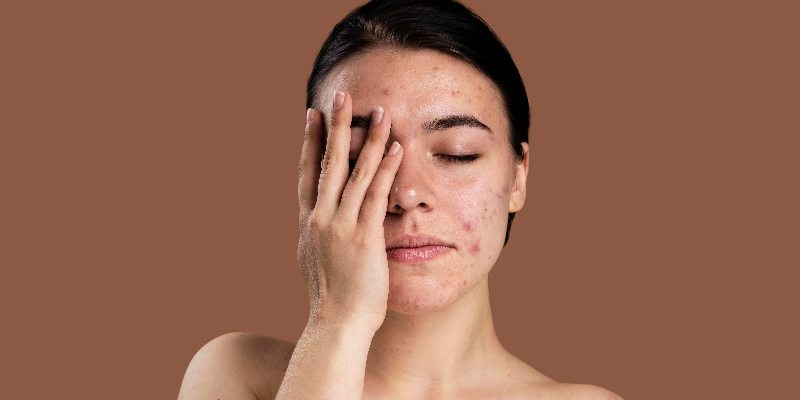Stress is a part of life for many of us.
From work deadlines to personal challenges, stress can creep into our daily existence. And while we often associate stress with mental and emotional strain, it can wreak havoc on our skin as well.
Acute stress and chronic stress are the two main categories of stress. Each of them adversely affects human skin in a different way.
According to studies, both acute and chronic stress can cause a wide range of skin issues, including eczema, psoriasis, seborrheic dermatitis, eczema-like breakouts, irritation, inflammation, skin itching, and many others.
The stress effects on skin isn’t among the most talked aspect of skincare. Stress has become so common nowadays that every one in five Americans is reported to have chronic stress, and only 37% are said to be able to control their stress.
If you experience high levels of stress, it is nearly certain that it will leave some form of imprint on your skin.
The Connection Between Stress and Skin Health
The connection between stress and skin health is complex and multi-faceted, but understanding it can help us take better care of our skin and minimize the negative effects.
So let’s first try to understand their interconnection.
What Exactly Does Stress Do?

Affects The Gut Health
The hundreds of millions of neurons in the gut have a considerable amount of autonomy and are constantly communicating with the brain. Stress can interfere with the brain’s ability to communicate with the gut, making it easier to experience pain, bloating, and other types of gut discomfort.
Millions of bacteria reside in the gut, and these bacteria can affect both the gut’s health and the health of the brain. Stress is also often associated with changes in gut bacteria. Since gut health is directly related to skin health, the effect of stress on gut health is directly visible to your skin.
Affects The Autonomic Nervous System
The sympathetic nervous system (SNS) and the parasympathetic nervous system (PNS) are two components of the autonomic nervous system that directly affect how the body reacts to stress. Adrenalin and cortisol are released by the adrenal glands in response to signals from the SNS.
When the body is under stress, these hormones, along with the immediate effects of the autonomic nerves, cause the heart to beat more quickly, the respiration rate to rise, the blood vessels in the arms and legs to widen, the digestive process to alter, and the glucose levels (sugar energy) in the bloodstream to rise to deal with the emergency. All of these are related to your skin health in one way or another.
Lowers The Body’s Immune
People under chronic stress are more likely to have an impaired immune system. This is also because of poor gut health due to stress, since about half of the body’s immune system lies in the gut.
In addition to defending your skin from harmful viruses and infections, your immune system also aids in the healing of wounds on your skin. So stress can weaken the skin’s natural defensive ability and can also delay wound healing.
Now, for those who follow Ayurveda, Ayurveda has also explained clearly the effect of stress on the human body. According to Ayurveda, Vata, Kapha, and Pitta Doshas are the three components that make up our body.
Our mind is governed by these doshas. Now, when their sub-doshas are out of balance, and our mind is under stress, Vata and Pitta produce drying and scorching effects, respectively, and Kapha produces more fluid to shield the brain from these effects. These effects are directly linked to the skin.
Stress Effects on Skin: Unveiling The Symptoms
Acne and Breakouts

Stress can cause acne and breakouts through a complex interplay of hormonal, immune, and inflammatory responses.
When you’re stressed, your body releases stress hormones like cortisol, which can stimulate the sebaceous glands in the skin to produce more oil. This excess oil, along with dead skin cells, can clog hair follicles. This can also create a favorable environment for acne-causing bacteria (Propionibacterium acnes) to thrive.
The combination of increased oil production and bacterial growth can lead to inflammation, redness, and the formation of acne.
Also Read: How to Reduce Sebum Production? A Comprehensive Guide
Reducing Wound Healing
Stress can disrupt the immune responses necessary for efficient wound healing. Elevated cortisol levels can weaken the immune system, reducing the body’s ability to fight off potential infections at the wound site.
Additionally, stress can constrict blood vessels, reducing blood flow to the wound area, which is essential for delivering nutrients and oxygen needed for tissue repair. Chronic stress can also lead to increased inflammation, which can prolong the healing process and result in the formation of larger, more noticeable scars.
Stress also increases the secretion of alpha-melanotropin in the brain, which has been found to suppress delayed-type hypersensitivity. This causes the immune response to take hours to days to develop, as opposed to the immediate hypersensitivity.
Premature Aging
Studies have shown that stress can lead to the breakdown of collagen and elastin, the proteins responsible for skin elasticity and smoothness. This collagen degradation can result in the formation of fine lines, wrinkles, and sagging skin.
Additionally, stress can impair the body’s ability to repair cellular damage and fight off free radicals, increasing oxidative stress and inflammation in the skin. Over time, this chronic inflammation can contribute to the premature aging process by accelerating the formation of age spots and exacerbating skin conditions.
Damages Protective Skin Barrier
Stress can lead to increased perspiration and water loss through the skin. When the skin loses too much moisture, it can become dry, flaky, and more susceptible to damage.
The inflammation caused by chronic stress can disrupt the skin’s barrier function by breaking down its structural components, including lipids and proteins. This can make the skin more vulnerable to irritants and allergens.
Also, the elevated cortisol level due to stress can disrupt the skin’s natural balance by increasing oil production, which can make the skin more prone to clogging and breakouts.
In an experiment, the 3 different levels of stress were examined on students and compared them with the recovery of barrier function. Interestingly, the increased level of stress during the examination period correlated with the disruption of epidermal barrier function which proves the ability of stress to damage the skin’s protective barrier.
Related Post: 11 Proven Ways to Repair Skin Barrier
How Can You Manage Your Stress Level?
There are basically two approaches to stress management: avoiding stress factors or increasing the body’s coping capacity. However, stress is inevitable in today’s generation, so the latter approach is more practical.
Now let’s discuss some of the extremely effective ways to manage your stress level:
Meditation

Meditation reduces stress by inducing the body’s relaxation response, lowering levels of stress hormones like cortisol, and promoting a sense of inner calm.
Through focused attention and mindfulness, meditation helps individuals detach from the stream of stressful thoughts and concerns, creating a mental space that is serene and tranquil.
This state of deep relaxation not only lowers heart rate, blood pressure, and muscle tension but also fosters emotional well-being, enhancing resilience and improving the ability to cope with stress.
Regular Exercises
Exercise reduces stress through several mechanisms. Physical activity prompts the release of endorphins, the body’s natural mood lifters, which can promote feelings of happiness and reduce stress and anxiety.
Exercise increases blood flow throughout the body, which supports cellular renewal or replacement and nourishes skin cells. Better food supply to the skin cells is another benefit of improved blood circulation.

An important thing is that extremely intense exercise can further exacerbate the issue of acne and breakouts in some people. So, about 15-20 minutes of light exercise is always a better option.
Related Topic: Best Exercises for Glowing Skin
Proper Sleep
Sleep helps regulate the body’s stress hormones, particularly cortisol. When you sleep, cortisol levels naturally decrease, allowing your body to recover from the day’s stressors. Chronic sleep deprivation can lead to elevated cortisol levels, which can contribute to heightened stress and anxiety.
Sleep is a time when the body undergoes physical repair and restoration. Muscles and tissues are repaired, the immune system is strengthened, and energy reserves are replenished. This physical rejuvenation helps the body better handle stress.
Furthermore, adequate sleep promotes a more stable and positive mood, making it easier to cope with stress.
So, you should always sleep for about 7-8 hours a day for better stress management.
Deep Breathing
Mindfulness techniques, such as deep breathing, promote relaxation and reduce the mind’s tendency to dwell on stressful thoughts.
It helps to activate the body’s relaxation response, leading to a decrease in stress hormones like cortisol and an increase in relaxation-inducing neurotransmitters.
It also helps to balance the autonomic nervous system, which governs the body’s “fight or flight” response. Through deep breathing, the parasympathetic nervous system, responsible for relaxation, is activated, counteracting the sympathetic nervous system’s stress response.
Consume Ashwagandha
Ashwagandha (Withania somnifera) is an adaptogenic herb that has been traditionally used in Ayurvedic medicine for its potential stress-reducing and anxiety-relieving properties.
Some studies have shown that ashwagandha supplementation can lead to a reduction in cortisol levels, especially in individuals with chronic stress.
Ashwagandha helps to modulate the GABA (gamma-aminobutyric acid) receptors in the brain, which can have a calming effect and reduce anxiety.
It also helps to improve mood by influencing neurotransmitters like serotonin and dopamine, which play a role in regulating mood and emotional well-being.
Relaxation Techniques
Engaging in creative activities like listening to soothing music or creating art can be relaxing and provide an outlet for self-expression.
Spending time in nature, whether it’s a walk in the park or a hike in the woods, can have a calming and rejuvenating effect on the mind and body.
Also Read: How to Get Clear Skin? 20 Tips That Include Everything
Few More Natural Remedies
In modern medicine, Panax ginseng has been established as a natural remedy for a number of clinical illnesses and is acknowledged as a stress-relieving substance.
An Ayurvedic oil called ksheerabala thailam can be applied to the feet to massage away stress. It is said to possess qualities that can optimize Vata dosha while also encouraging restful, deep sleep.
A soothing massage with warm oil can do wonders for balancing stress levels. Also, avoid spicy foods, smoking, and alcohol intake. You can also calm your occasional anxiety with therapeutic aromas.





